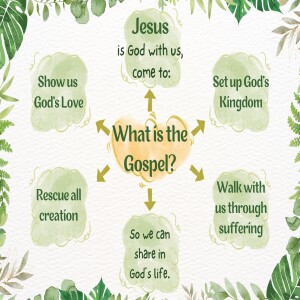
9.7K
Downloads
332
Episodes
U-turns are permitted in life. We grow, change, fail and succeed. We believe that God is there, that He loves us and will bring us safely through whatever life throws our way. That's why we can make u-turns when necessary with confidence and not fear. This podcast is sponsored by Trinity Christian Reformed Church in Broomall, Pa.
Episodes

Tuesday Jul 01, 2025
Jesus Rescues All of Creation
Tuesday Jul 01, 2025
Tuesday Jul 01, 2025
Our series on "What is the Gospel?" continues with thinking about how Jesus rescues all of creation, on every level, from the intensely personal to cosmos-wide.

Monday Jun 02, 2025
Jesus Shows Us God's Love
Monday Jun 02, 2025
Monday Jun 02, 2025
Part 2 of the "What is the Gospel?" series. Jesus has come to earth to show us God's love. What is God's love? And what about God's wrath? And what do you do if things are pretty bad and God's love seems far away?

Wednesday May 28, 2025
What is the Gospel? Part 1
Wednesday May 28, 2025
Wednesday May 28, 2025
This is the first in a series of 6 sermons that attempt to unpack what the "Good News" (Gospel) of Jesus Christ is. Many of us aren't clear or have a too narrow version of the Good News. There is much comfort, hope, and meaning when we come to understand the richness of what God has done for us and all of creation through Jesus Christ - especially in the times in which we live.

Tuesday Nov 07, 2023
Today the Kingdom is Here
Tuesday Nov 07, 2023
Tuesday Nov 07, 2023
This is the last service in the life of Trinity CRC in Broomall. We now conclude our ministry. But that doesn't mean the Kingdom has not been present, or that it will not be present going forward. Isaiah 61 and Luke 4 serve as our source of encouragement.

Sunday Oct 29, 2023
In Him Are All Things
Sunday Oct 29, 2023
Sunday Oct 29, 2023
Romans 11:36 reads: "For from him and through him and to him are all things. To him be glory forever. Amen." This verse sums up the story of the Bible that goes all the way back to Genesis, and it gives us enormous hope and purpose for the future.

Sunday Oct 29, 2023
Contentment
Sunday Oct 29, 2023
Sunday Oct 29, 2023
"I can do all things through Christ who strengthens me" is a well-known text from Philippians 4:13. Paul connects this to the concept of "contentment" in 4:11. Contentment means to "stand strong" and self-sufficient in Christ so that the waves of life don't overcome us.

Thursday Oct 19, 2023
The Sower Sowed
Thursday Oct 19, 2023
Thursday Oct 19, 2023
Today we read the famous "Parable of the Sower" from Matthew 13. R.F. Capon calls this a "watershed moment" in Jesus' teaching, and that it is. It is much more than "how to listen to a sermon". Your whole perspective on the world might change!

Thursday Oct 12, 2023
Great Is Your Faithfulness
Thursday Oct 12, 2023
Thursday Oct 12, 2023
Today we read the famous "Great is Your Faithfulness" passage from Lamentations 3. We place these verses of hope squarely where they are - surrounded by despair. We don't ignore the despair, nor do we allow the despair to quench the light of hope. We hold both together.

Monday Oct 02, 2023
Be Strong and Courageous
Monday Oct 02, 2023
Monday Oct 02, 2023
As the ragtag people of Israel stand ready to enter Canaan, the Promised Land, God encourages them to be strong and courageous, and not to fear, because He will be with them always. Jesus promises the same to his ragtag group of disciples as He prepares to leave them after His resurrection. And the same promise is for us today.

Sunday Oct 01, 2023
When God Began to Create the Heavens and the Earth
Sunday Oct 01, 2023
Sunday Oct 01, 2023
Today we read Genesis chapter 1, the beginning of the Gospel, the good news, that God is creating out of welter and waste, and He invites us to join Him in that creative process.
